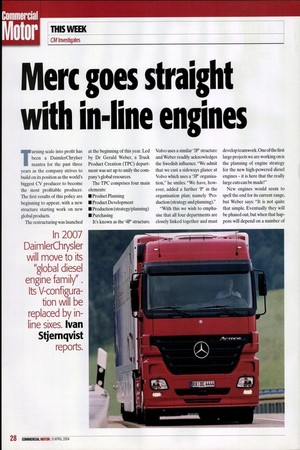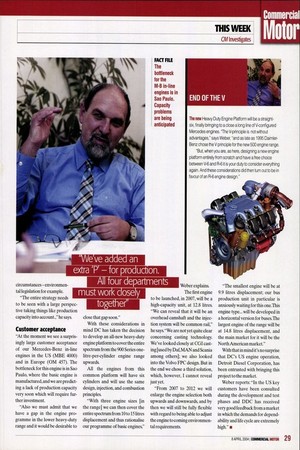Men goes straight with in-line engines
Page 28

Page 29

If you've noticed an error in this article please click here to report it so we can fix it.
Turning scale into profit has been a DaimlerChrylser mantra for the past three years as the company strives to build on its position as the world's biggest CV producer to become the most profitable producer. The first results of this policy are beginning to appear, with a new structure starting work on new global products. The restructuring was launched
at the beginning of this year. Led by Dr Gerald Weber, a Truck Product Creation (TPC) department was set up to unify the company's global resources. The TPC comprises four main elements: • Product Planning • Product Development • Production (strategy/planning) • Purchasing
It's known as the `4P' structure.
Volvo uses a similar `3P' structure and Weber readily acknowledges the Swedish influence. "We admit that we cast a sideways glance at Volvo which uses a `3P' organisation," he smiles. "We have, however, added a further '13' in the organisation plan; namely 'Production (strategy and planning)." "With this we wish to emphasise that all four departments are closely linked together and must
develop teamwork. One of the first large projects we are working on is the planning of engine strategy for the new high-powered diesel engines — it is here that the really large cuts can be made!" New engines would seem to spell the end for its current range, but Weber says: "It is not quite that simple. Eventually they will be phased out, but when that happens will depend on a number of
circumstances — environmental legislation for example.
"The entire strategy needs to be seen with a large perspective taking things like production capacity into account.," he says. Customer acceptance
"At the moment we see a surprisingly large customer acceptance of our Mercedes-Benz in-line engines in the US (MBE 4000) and in Europe (OM 457). The bottleneck for this engine is in Sao Paulo, where the basic engine is manufactured, and we are predicting a lack of production capacity very soon which will require further investment. "Also we must admit that we have a gap in the engine programme in the lower heavy-duty range and it would be desirable to
close that gap soon."
With these considerations in mind DC has taken the decision to develop an all-new heavy-duty engine platform to cover the entire spectrum from the 900 Series onelitre-per-cylinder engine range upwards.
All the engines from this common platform will have six cylinders and will use the same design, injection, and combustion principles. "With three engine sizes [in the range] we can then cover the entire spectrum from 10 to 15 litres displacement and thus rationalise our programme of basic engines,"
Weber explains.
The first engine to be launched, in 2007, will be a high-capacity unit, at 12.8 litres. "We can reveal that it will be an overhead camshaft and the injection system will be common rail," he says."We are not yet quite clear concerning casting technology. We've looked closely at CGI casting [used by Daf, MAN and Scania among others]; we also looked into the Volvo FPC design. But in the end we chose a third solution, which, however, I cannot reveal just yet.
"From 2007 to 2012 we will enlarge the engine selection both upwards and downwards, and by then we will still be fully flexible with regard to being able to adjust the engine to coming environmental requirements.
"The smallest engine will be at 9.9 litres displacement; our bus production unit in particular is anxiously waiting for this one.This engine type... will be developed in a horizontal version for buses. The largest engine of the range will be at 14.8 litres displacement, and the main market for it will be the North American market."
With that in mind it's no surprise that DC's US engine operation, Detroit Diesel Corporation, has been entrusted with bringing this project to the market. Weber reports: "In the US key customers have been consulted during the development and test phases and DDC has received very good feedback from a market in which the demands for dependability and life cycle are extremely high!, •






































































































